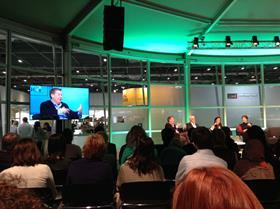
Encouraging shoppers to buy more fruit and veg is the single-biggest thing public health benefit that retailers can provide, according to a senior buyer at Tesco.
David Beardmore, senior buyer for soft drinks at Tesco, was speaking at Food Matters Live on the topic of what retailers can do to help tackle obesity.
Tesco has taken the lead among retailers by reducing sugar content of soft drinks, but Beardmore instead chose to flag up the retailer’s free fruit to kids initiative, which gives produce to children while parents shop.
He said: “The biggest public health benefit we can bring is through selling increasingly good quality and good value fruit and vegetables. We do that through low prices, and initiatives like free fruit for kids in stores. We have given away 5.5 million pieces of fruit through this scheme so far.
“The next thing is reformulation. Since 2012 we’ve changed the composition of 4,200 products. We’ve been at salt since 2004, fat since the 1990s, and at the moment it's sugar.”
Claire Hughes, head of nutrition and science at M&S, said being healthy “doesn’t mean the same thing to every customer”. “For some, it’s eating more fruit and veg, for others it’s gluten free,” she said. ”Shoppers don’t want to be told what not to do, or choosing ‘lower fat’ etc – they want to be inspired to eat healthily. That’s what M&S TV advertising has helped to do. Healthy food shouldn’t be a compromise – it’s about great-tasting products.”
Marketing director at Pret A Manger, Mark Palmer, said the demand for healthy food is there, noting that healthier menu choices have been one of the biggest drivers of Pret’s sales growth. “We’ve seen an acceleratoin of healthy lines. Green juice is a major volume line, second only to orange juice,” he said.
“Customers are ready for change, but only if you make it easy for them with delicious recipes and non-intimidating marketing. People want healthy eating to be part of their every day lives, not placing as a minority group.”
Questioned by chair Anita Anand on whether Tesco could also take the lead on reducing junk food advertising or banning cartoon characters on junk food, Beardmore confirmed the retailer is looking at this.
“You will soon see parity on promotions on healthy and unhealthy soft drinks, and you’re not far away from seeing parity across promotions on healthy food as well,” he said.
Palmer said Pret’s veggie-only store last year was designed to “fast-track” its vegetarian NPD. “We are actively pushing vegetarian and vegan food,” he said. “The purpose of that store was to fast-track our NPD - the real outcome was to roll out these products to other stores. We’ve condensed a product development programme into one store, and provided ourself with a live space to test customer reaction.
“We’ve made many veggie options into ‘must-stock’ options, whereas in the past they were optional and it was up to the store manager to decide.”
He added that customers want healthy food providing there is no compromise on taste, and said that as a result Pret focuses on innovative recipe development rather than “buying products from a catalogue”.



